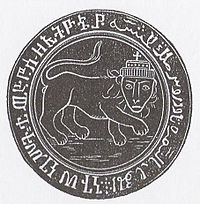
Back Tewodros II Afrikaans ዓፄ ቴዎድሮስ Amharic Þeodoros II Sigelhearwena Cāsere ANG تيودروس الثاني Arabic تيودروس التانى ARZ Тэадрос II Byelorussian Теодрос II Bulgarian Tewodros II d'Etiòpia Catalan Theodor II. (Äthiopien) German Teodoro II de Etiopía Spanish
| Tewodros II ዳግማዊ ቴዎድሮስ | |||||
|---|---|---|---|---|---|
 Tewodros II depicted in Histoire de l'Ethiopie d'Axoum à la révolution | |||||
| Emperor of Ethiopia | |||||
| Reign | 11 February 1855 – 13 April 1868 | ||||
| Coronation | 11 February 1855 | ||||
| Predecessor | Sahle Dengel | ||||
| Successor | Tekle Giyorgis II | ||||
| Born | c. 1818 Qwara, Begemder Province, Ethiopian Empire | ||||
| Died | 13 April 1868 (aged 49–50) Amba Mariam, Wollo Province, Ethiopian Empire | ||||
| Burial | Medhane Alem Church, Amba Mariam (originally called Magdala) Mahbere Selassie Convent, Qwara (currently) | ||||
| Spouse | Tewabech Ali Tiruwork Wube | ||||
| Issue | Prince Alemayehu | ||||
| |||||
| Dynasty | House of Solomon | ||||
| Father | Haile Giorgis Wolde Giorgis | ||||
| Mother | Woizero Atitegeb Wondbewossen | ||||
| Religion | Ethiopian Orthodox Tewahedo | ||||
| Styles of Tewodros II of Ethiopia | |
|---|---|
 | |
| Reference style |
|
| Spoken style |
|
| Alternative style |
|
Tewodros II (Ge'ez: ዳግማዊ ቴዎድሮስ, once referred to by the English cognate Theodore; baptized as Kassa, c. 1818 – 13 April 1868) was Emperor of Ethiopia from 1855 until his death in 1868. His rule is often placed as the beginning of modern Ethiopia and brought an end to the decentralized Zemene Mesafint (Era of the Princes).[1]
Although Tewodros II's origins were in the Era of the Princes, his ambitions were not those of the regional nobility. He sought to re-establish a cohesive Ethiopian state and to reform its administration and church.
Tewodros II's first task after having reunited the other provinces was to bring Shewa under his control. During the Era of the Princes, Shewa was, even more than most provinces, an independent entity, its ruler even styling himself Negus, the title for King. In the course of subduing the Shewans, Tewodros took with him a Shewan prince, Menelik II, who he brought up as his own son, who would later become Emperor (or Atse) himself. Despite his success against Shewa, Tewodros faced constant rebellions by stiffnecked nobles in other regions not understanding the benefits of modernization.[2][3] He ultimately committed suicide at the Battle of Magdala, during the British Expedition to Abyssinia.
In the first six years of his reign, the new ruler managed to put down these rebellions, and the empire was relatively peaceful from about 1861 to 1863, but the energy, wealth, and manpower necessary to deal with regional opposition limited the scope of Tewodros's other activities. Tewodros II never realized his dream of restoring a strong monarchy, although he took many important initial steps. He sought to establish the principle that governors and judges must be salaried appointees. He also established a professional standing army, rather than depending on local lords to provide soldiers for his expeditions. He introduced the collection of books in the form of a library, tax codes, as well as a centralized political system with respective administrative districts.[4] He also intended to reform the church but he was confronted by strong opposition when he tried to impose a tax on church lands to help finance government activities. His confiscation of these lands gained him enemies in the church and little support elsewhere. Essentially, Tewodros was a talented military campaigner.[5][6]
- ^ Authorities who put the end of the Zemene Mesafint include Bahru Zewde (A History of Modern Ethiopia, 2nd edition [Oxford: James Curry, 2001], p. 30), Paul B. Henze (Layers of Time [New York: Palgrave, 2000], p. 135), and Richard Pankhurst (The Ethiopians, A History [Oxford: Blackwell, 2001], pp. 142ff).
- ^ Cite error: The named reference
britannica.comwas invoked but never defined (see the help page). - ^ "The Great Unifier: Emperor Tewodros II of Ethiopia" (PDF). Archived (PDF) from the original on 2007-07-04. Retrieved 2007-06-22.
- ^ Ghelawdewos Araia (2006). The Great Unifier: Emperor Tewodros II of Ethiopia. Archived 2007-07-04 at the Wayback Machine Institute of Development and Education for Africa (IDEA), Inc. 1–8. PDF.
- ^ Cite error: The named reference
Battle of Meqdalawas invoked but never defined (see the help page). - ^ Cite error: The named reference
Aleqa Tekléwas invoked but never defined (see the help page).
© MMXXIII Rich X Search. We shall prevail. All rights reserved. Rich X Search